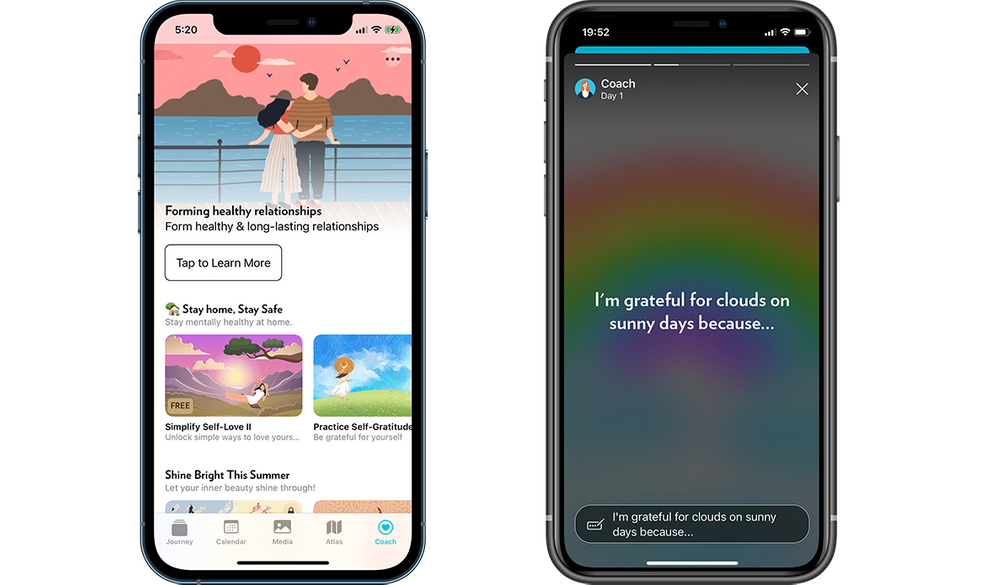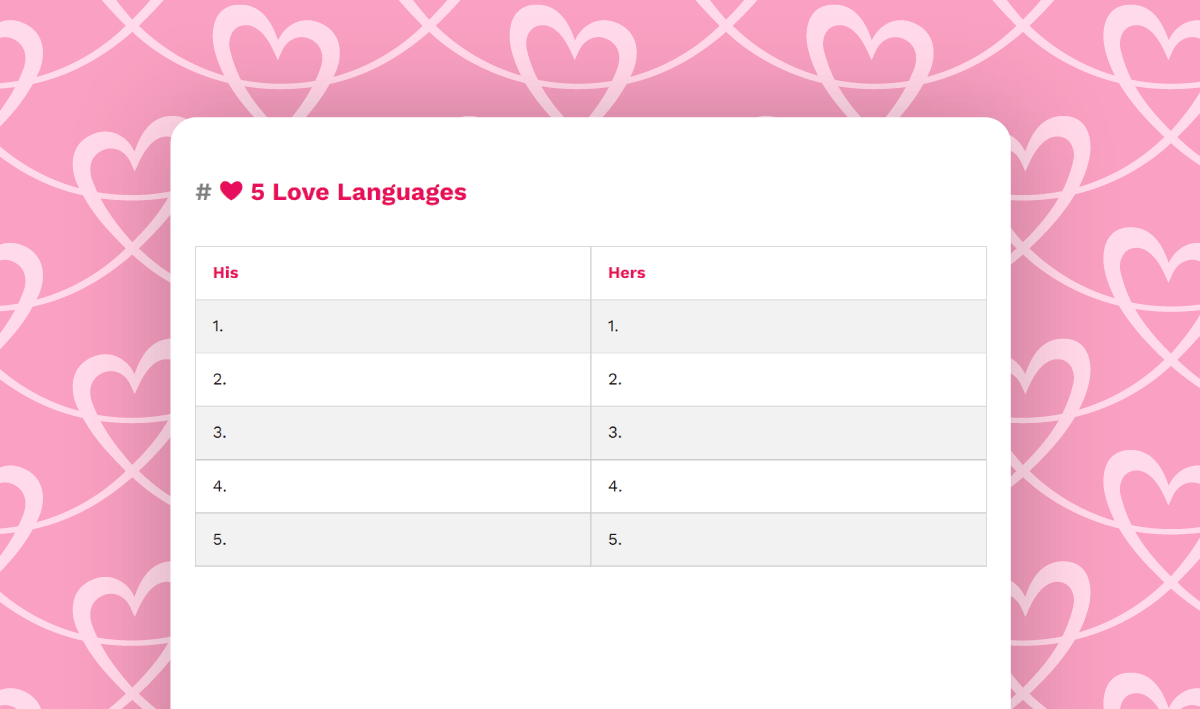Using The 5 Love Languages by Gary Chapman To Strengthen Your Relationships
Everyone has a different way of communicating their love. We express and wish to receive love differently, and Gary Chapman explores this distinction in his book "The 5 Love Languages". Read on to find out more about the fundamentals of each, and understand your loved ones better.

As humans, we all express and desire to receive love differently. These differences could be the reason why feelings and good intentions sometimes get lost in translation. When you do not receive the appreciation you expected from the other party, it's not because they’re ungrateful or that the time and energy you spent searching high and low for the "perfect" gift has gone to waste. But it is highly likely that they just communicate their love differently, or have a different love language.
Recognizing how you and a loved one like to receive and express can allow for more thoughtful and meaningful connections to be built, and for healthy relationships to blossom.

Definition Of The 5 Love Languages
Different people with differing personalities desire to give and receive love in different ways. By learning your loved ones' preferences, and your own, you can connect more meaningfully, grow closer, and even identify the root of your conflicts and miscommunication.
The concept of the 5 love languages was developed by Gary Chapman, Ph.D., in his book The 5 Love Languages: The Secret to Love That Lasts. He explains that these 5 unique styles of communicating love and draws from his experience in marriage counseling and linguistics to explain what each encompasses and the distinctions between them.
The 5 Love Languages
The five love languages are:
- Quality Time
- Words of Affirmation
- Receiving Gifts
- Acts of Service
- Physical Touch

1. Quality Time
People whose love language is quality time feel the most appreciated and loved when their significant other, loved ones, or friends want to spend time with them and are given undivided attention. This quality time involves active listening, eye contact, and full presence; hallmarks of true appreciated and adoration.

2. Words of Affirmation
Words of affirmation is all about expressing affection, love, gratitude, and appreciation through words: be it spoken, written, in texts, or all of the above. Verbal expressions of love and appreciation
For a loved one, if their love language happens to be words of affirmation, it would mean that telling them you love them, or appreciate their time and energy more often, or checking in on them throughout the day to tell them you’re thinking of them makes them feel loved.
For a friend, words of affirmation could mean that sending them a text saying “You’ll do great!” before a job interview or complimenting them on their outfit could turn their day around.

Here are some examples of words of affirmation that can use in your relationships:
- “I love you.”
- “Our friendship is really important to me and I value you.”
- “You got this! You're worthy of this.”
- “I’m so proud of you. You've done your best.”
- “Thank you for loving me as I am.”
- "I accept you as you are."
- "I appreciate the time you're spending with me."
- "Being around you makes me happy."
3. Receiving Gifts
Receiving gifts, or tangible tokens of love and thoughtfulness is another love language. For someone whose love language is tangible gifts, it does not mean that they desire material goods and need to be given physical presents to feel loved or appreciated. It goes well beyond just wanting things. For this person, it’s more about the meaning and thought that went into the gift rather than it's cost or material value.
When it comes to gift-giving, put in thought and time to choose the most significant gift; something that would stir emotion and make the receiving party feel heard. If your love language is receiving gift, when someone commemorates an event, achievement, or just decides to get you a thoughtful token without any specific reason, there is no doubt that you would treasure anything that a partner or friend gives you, no matter how small. Showing love through gift-giving isn’t about extravagance. The smallest of gifts will appreciated, because big or small, a gift is a tangible reminder that they were thought of and are loved.

Choosing gifts that are personal to your relationship always works, something related to an inside joke or shared memory that you have. Here are some ways to show love to someone whose love language is receiving gifts:
- Picking up their favorite pastry from a bakery on your way home.
- Surprising them with a small bouquet of flowers
- Writing them a card
- Bringing your best friend a keepsake from your early friendship, like a picture from when your friendship just blossomed
4. Acts of Service
If your loved one's love language is acts of service, they value it when you go out of your way to make your life easier with selfless, thoughtful acts. It's the small things like bringing them some hot soup when they're unwell, or making them coffee in the morning, or picking up their dry cleaning when they've had a long at work that they see and feel loved by.

People who value this love language believe that actions speak louder than words. People in this category like to be shown how they're appreciated. Doing things that make their lives a little easier or more comfortable is highly cherished by them.
5. Physical Touch
If your love language is physical touch, that would mean that you prefer physical expressions of love over all other expressions such as verbal compliments or gifts. A hug, a shoulder squeeze, a handhold, even a pat on the back can be an expression of love that is just as meaningful to you.

One of the more clear benefits of wanting to express your love and appreciation to someone whose love language is physical touch is that you can express love without having to speak, or without having to do the dishes, or go out and buy a gift. Physical touch is one of the easiest ways to express love to your partner or friends, and it's a way to develop emotional intimacy and trust.
Benefits Of Understanding The 5 Love Languages
Understanding the 5 love languages and how the people around you respond to them will allow you to develop an increased empathy and understanding of others. You better understand the needs of your partner or the people you love, and this will add to a strengthened bond and relationship.
Understanding the five love languages can also guide you towards better communication and help you better express your needs with your partners, family, and friends.
Understanding the nuances of these modes of appreciation can help people better appreciate the love and care their partner or other people in their lives show them. Even if your love language differs from that of your loved one, acknowledging and understanding their perspective on expressing and receiving love can facilitate the dynamics of the relationships as well, in turn to strengthening those relationships.
It also contributes to an increased self-awareness. It encourages you to take ownership of your feelings and commitment, and develop a deeper understanding of the way you like to express and receive love; helping you become a better friend, partner, or family member.
Identifying Yours And Your Loved One's Love Language
Journey Coach
Understanding relationships take work. With intentional reflection on your romantic relationship, you can become much clearer on what you wish to achieve in the relationship. Identify habits that you need to build and maintain, problems that you need to fix, and issues that you need to prevent with Journey Coach's Love & Relationship program.
If you would like to assess how you communicate and listen to others in the content and tone of your words and your body language, try Journey Coach's Mindful Communication I and Mindful Communication II programs. With these guided programs, you can find ways to engage more mindfully in order to build deeper and more meaningful connections with other people.

If you want to explore what love means to you and how you can experience the fullest love in either a current or future relationship, try the Exploring Love & Relationships I and Exploring Love & Relationships II programs to guide you along.
Journaling
To better understand your relationships, your expectations, and the expectations your loved ones might have from you, you can consider starting a journal on a platform like Journey to take yourself and your loved ones through some questions that will allow you to reflect on the dynamics of your relationship and identify your individual love languages.
Some of the questions that you could explore include:
- When do you feel most appreciated by me?
- When was the last time you felt love and appreciation?
- What was the last gift you received and how did it make you feel?
- What do you value in a friendship the most?
- What would make you feel loved right now?
- What does quality time mean to you?
- What have I not done enough of for you recently?
- What do you think I value most in our friendship/relationship?
If you're looking to discover and understand your partner's or loved ones' love language and you are not sure how to go about it, Journey's 5 Love Languages template can guide you with this. Rank the languages for yourself and your partner and generate ideas that you could carry out for each type.

As you rank each other's love language, engage in conversation about how perceive love and what it means to you to be appreciated and cared for. Develop deeper connections and understand yourself better at the same time with this template and conversation.
The five love languages provide the fundamentals and framework for helping you better understand yourself and your relationship. The chances that you strongly resonate with one, or more than one of the love languages is high, and it is key to understand where all the 5 rank in your personal understanding and expectations. You may also have one love language for how you like to receive love and a different love language for how you like to give love, and this is completely normal.
Everyone has a different way of communicating their love. While you shouldn’t take it as gospel, the love languages could be a helpful starting point on your way to understanding your loved ones better.


